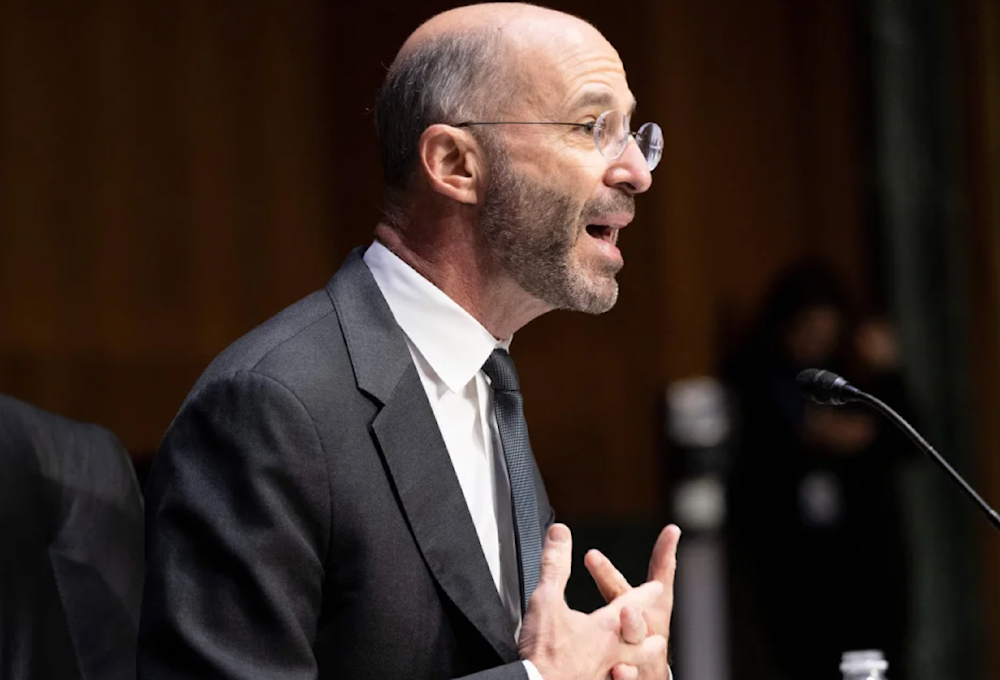US envoy who pursued nuclear deal now faces career fallout: WSJ
Malley assisted in negotiating the 2015 nuclear agreement with Iran, known as the Joint Comprehensive Plan of Action, and was asked to do so again in 2020.
-

Robert Malley, Biden administration special envoy for Iran, testifies about the Joint Comprehensive Plan of Action during a hearing of the Senate Foreign Relations on Capitol Hill on May 25, 2022. (AFP)
Joe Biden's Iran envoy Robert Malley sought to revive the 2015 nuclear agreement when he participated in the Vienna talks, The Wall Street Journal reported.
Instead, Malley was accused of misleading Western partners and clashed with some of his important subordinates, and within 16 months after the talks ended, Malley found himself embroiled in an FBI inquiry into whether he had inappropriately handled secret information, perhaps shifting sensitive files to a personal email account.
Known for his nuanced approach to geopolitical issues, Malley has a long history of engaging with adversaries in the Middle East. An investigation into his conduct has sparked tensions between the FBI, which criticized his work as sloppy, and State Department officials who defended him. A senior official stated that the allegations against Malley did not constitute serious misconduct.
While working for the International Crisis Group, a Brussels-based think tank, he met with leaders of Hamas and Hezbollah, and during Barack Obama's second term, he focused on reaching an agreement to limit Iran's nuclear program, and Malley's Iranian ties grew increasingly essential.
Malley assisted in negotiating the 2015 nuclear agreement with Iran, known as the Joint Comprehensive Plan of Action, and was asked to do so again in 2020.
Biden, Blinken, and Malley outlined conditions for reviving the 2015 nuclear deal when talks resumed in Vienna in April 2021 allegedly aiming to contain Iran's nuclear weapon development.
Enrique Mora, a Spanish negotiator who participated in the talks, told WSJ that the main criticism against Malley was "how much he unveiled," since Malley suggested lifting US sanctions to align with the original agreement.
This straightforward approach raised concerns among some team members, who feared he was revealing too much too early.
Iran demanded the removal of its elite military force, the Islamic Revolutionary Guard Corps, from the US foreign terrorist organization list, leading American negotiators to potentially choose between securing a quick deal or a lasting agreement.
The talks collapsed without an agreement in June 2021, following the election of the late Ebrahim Raisi, and when resumed in 2021, Malley argued for the US to remain engaged, cautioning that the cost of persuading Tehran to return to talks later could be costly.
The decision to stay fractured the US negotiating team, leading to the resignation of Malley’s deputy, Richard Nephew, who cited “a sincere difference of opinion concerning policy” on X. Another team member, Ariane Tabatabai, also left and a European negotiator commented that the US indicated it was "quite desperate to get a deal."
Negotiations with Iran stalled again for several months, but Western officials made a final attempt by presenting a draft deal that included sanctions relief for Iranian banks and other entities, excluding the IRGC. Iran ultimately rejected this proposal.
Malley's actions inconsistent with interest of US national security
Meanwhile, an investigation into US envoy Malley revealed that law enforcement officials received “adverse information” about him, linked to a phishing incident that compromised his personal email. Investigators found evidence suggesting he may have moved classified material, including meeting notes, to his account. On April 22, Malley was formally notified that his security clearance had been suspended.
During a closed-door Senate Foreign Relations Committee meeting on Iran in May, Malley was notably absent, with State Department officials citing a personal matter. Months later, the Tehran Times, an Iranian state media outlet, unexpectedly published a photograph of the letter notifying Malley of his clearance suspension, without revealing how they obtained it.
Negotiations with Iran stopped again for several months, and a draft agreement that contained sanctions relief for banks and other institutions save the IRGC was rejected.
Malley was noticeably absent from a closed-door Senate Foreign Relations Committee discussion on Iran in May, with State Department officials citing a personal reason.
Tehran Times exclusively reported in July 2023 that Malley's security clearance was stopped on April 21 by violating three US national security standards.
Although the memorandum does not list examples of how Malley's conduct endangered US national security or mishandled protected information, the Tehran Times previously reported that Malley's suspicious contact with his aides of Iranian descent contributed to his downfall.
Before taking office, Malley had substantial interaction with a web of Iranian-American individuals ranging from Ali Vaez and Vali Nasr to Trita Parsi. His son continues to work with Parsi at the Quincy Institute.
According to a previous Tehran Times investigation, Malley maintained regular touch with at least Vaez during his term as Iran's ambassador.
Tehran Times previously reported on a secret memo detailing Malley and Vaez's behind-the-scenes plans to organize a coup in Iran amid the Mahsa Amini riots in 2022.
According to the paper, Vaez compiled a list of 14 Iranian personalities as part of the State Department's larger campaign to increase pressure on Iran. The list featured prominent opponents, as well as others unknown to the public.
Currently on unpaid leave from the State Department, Malley is currently teaching at Princeton and Yale, awaiting the conclusion of an FBI investigation.

 5 Min Read
5 Min Read










